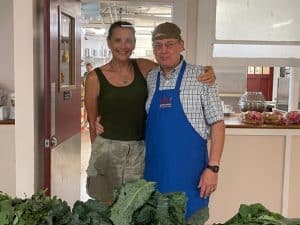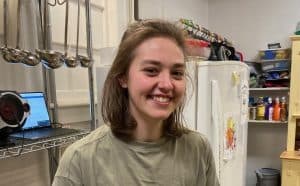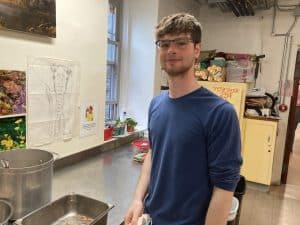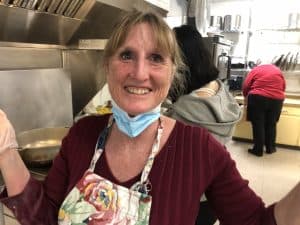
It’s a Wednesday afternoon at CHD’s Not Bread Alone (NBA) community meals program, and volunteers are hard at work making chicken piccata and mango crisp. The scrumptious smell of baked Asian spice cauliflower, a side dish, fills the air, as several members of CHD’s Community Engagement team volunteer for a few hours to help NBA’s regular volunteers prepare dinner and dessert.
The busy kitchen in the lower level of the First Congregational Church in Amherst is organized chaos, and this writer/volunteer is doing his best to stay out of everyone’s way. I am not successful.
“Here, you can wash and chop these green beans,” said Program Supervisor and Volunteer Coordinator Bob Stover as he pulls me aside. To be clear, I want to help, but I’m mainly here to interview volunteers and take photos. Still, I know I should do my part in food preparation, so I put down the camera and pick up a colander to rinse off the beans. Not having any kitchen skills, I am confident nonetheless that I can cut these beans without slicing my fingers. I am successful.
NBA, which depends on volunteers and donations to survive, including food from Big Y and Whole Foods Market in Hadley, has had to adapt its meal program from its usual family-style dining to a “takeout” model because of COVID, but the program still serves its usual three meals a week on Wednesdays, Saturdays, and Sundays, and continues to pass out groceries on Saturdays. NBA also offers meals on Thanksgiving and Christmas.
Prior to the pandemic, NBA was serving 80 to 100 people on Saturdays, and 40 to 60 on Wednesdays and Sundays. Those numbers have been down since the program switched to serving to-go meals, “but they’re slowly climbing,” said Stover. NBA recently offered the option of letting a half-dozen guests eat at one solitary table and using social distancing guidelines, but it’s a far cry from the days where the lower level of the church was really humming. “The dining room was filled with people at tables, with tablecloths, silverware, flowers, and nice place settings,” said Stover with a tinge of sadness. “This room used to be so colorful and happy, and we’re just starting to get our toe in the water to get back to that.”

The need for NBA has never been greater ever since the pandemic, with the economic effects of COVID disproportionally affecting the marginalized in society. Stover said that initially many NBA guests stayed away, avoiding gatherings of people, but he is optimistic the numbers will continue to rise, especially if no new COVID variants emerge in the summer.
To be sure, this year community meal programs like NBA are especially vital in fighting hunger, as inflation rises at its fastest rate in four decades. Recent price hikes in groceries have been particularly devastating to lower-income households. “Food prices are absolutely skyrocketing right now,” said Stover. “I’ve been buying food for this program for years, and suddenly instead of paying $3.99 for something, I’m paying $5.99.”
Food Insecurity a Widespread Concern
Amherst is the quintessential college town, culturally rich with tree-lined streets, but there is also a rising homeless population, and food insecurity is increasingly a problem here. “There are people who are barely scraping by, there are senior citizens on fixed incomes, in public housing—so there are a lot of people who are not financially comfortable in Amherst,” said Stover.
NBA volunteer Brenna Jorgensen, a junior at UMass Amherst majoring in Education and Social Change, agreed with Stover that the economy has exacerbated food insecurity in Amherst. “Students and faculty put a lot of pressure on the local housing market, and this pushes people into more financially stressful situations,” she said.
Food insecurity is a subject that Stover has long been deeply invested in and passionate about. “America is an affluent country, but there are always going to be large numbers of people who are never quite going to get connected, or accumulate enough wealth to retire without worries,” said Stover. “And the reasons for that are myriad—including thwarted lives, and serious mental health problems and substance use problems.”

But Stover added that some of the people NBA serves have college degrees who have simply come upon difficult times. On that Wednesday, brief interviews with several NBA guests waiting for to-go meals to be packaged confirmed that there is a segment of educated poor in Amherst who are seeking a helping hand. “I’m paying $70,000 in student loans,” explained Isis. “I’m paying Medicare premiums. I’m retired now and I’m not getting much in Social Security, so this meal program really makes a difference.”
An elderly guest who identified himself as Shénmì Rén, which in Chinese means “Mystery Man,” said he was a schoolteacher in his working years. “I never had a big salary anyway, and then my pension ran out, and I have nothing but social security now,” he said. He had high praise for the volunteers at NBA. “Having a Quaker background, I look for the inner light in every individual, and these volunteers glow like the stars. They’re amazing.”
Cathy Etheridge, a frequent guest, said she enjoys the fellowship at NBA even more than the food, and terribly misses the sit-down meals. “I’m a widow and I live alone,” she said. “It’s easier to talk with people when you’re eating than when you’re just waiting here for the volunteers to put together your bag of food. People are more congenial when they’re eating. It’s how we were brought up—eating together at the dinner table.”
Rén agreed. “Sometimes I’ll have a hot chocolate with a couple of folks here after I put my food in the car.”
“I just come here to hang out with friends like Isis,” said Etheridge, prompting a giggle from Isis.
All three can’t wait until the dining room is fully open again for community meals. “It was a family-like atmosphere,” recalled Rén.
Stover said that in non-COVID times, many guests stayed after the meal to help clean up, fold chairs, mop, and take out the trash. “It’s wonderful to witness this sense of community,” he said.
A History of Helping
Not Bread Alone served its first meal on September 13, 1983 with simple fare of soup and bread. Known as The Soup Company back then, it was renamed when it became a CHD program in 1989. Stover, a member of the First Congregational Church, began volunteering at NBA in 2009, and CHD hired him as program supervisor in 2011.
Stover has long been an environmental consultant—and he still is, “but Not Bread Alone has become my primary passion in life,” he said. His first foray into large-scale cooking was when he was a part-time DJ who hosted Latin dance party cookouts in Look Park in Northampton from 1999 to 2003. “The gatherings were a complete success,” he said. The rest is history: now for three days a week he runs a kitchen that rivals a restaurant’s operation.
A 1999 book, Sweet Charity? Emergency Food and the End of Entitlement, written by sociologist Janet Poppendieck, had a profound effect on Stover. The book is a work of engaged scholarship analyzing hunger in the United States. “There are three or four pages in the middle chapter of the book, entitled ‘Charity and Dignity,’ in which the author, who traveled the country looking at food pantries and community meal programs, knocks on the door of a church that has a food pantry,” he said. “She was casually dressed and kind of stumbled when she tried to explain to the pastor that she was there to interview him. He asked her, ‘Do you need food?’ She was blown away. She experienced a wave of humiliation and shame that this person would think of her as indigent. That experience greatly shaped her realization of what it was like for someone to get ‘charity’ in this country.”

Stover pointed out that for many, the word “charity” has an extremely negative connotation. “This passage in the book tells you that nobody wants to be the person who is helped—everyone wants to be the person who helps other people, especially in our society,” said Stover. “There is such shame attached to that. So can we overcome this? Can we make things democratic enough that giving food to someone who needs it isn’t associated with charity—that people can come to a community meal program like ours and be part of a group of people who like to be together, and like good food?”
Fighting Hunger and Stigma
Volunteer Deb Napier, a weekly fixture at NBA, was awarded CHD’s Volunteer of the Year award in 2020 for her support not only at NBA, but also CHD’s Family Outreach of Amherst, a safety net for low-income families that provides a variety of services. She has helped support both programs in a number of ways, including bolstering fundraising efforts and sourcing hard-to-find supplies. Stover laughed that she “has more energy than a nuclear explosion.”
Napier said society tends to avoid thinking about people affected by food insecurity because it makes them uncomfortable. “To some, they’re invisible,” she said. “To us, they’re not invisible. Some of these people live in apartments, and some live in shelters. They are struggling to just put food on the table, and that’s what we do for them. We’re a place where they can go and count on very healthy meals and not feel ashamed about it. At Not Bread Alone, we serve people who not only want a meal, but want a community as well.”